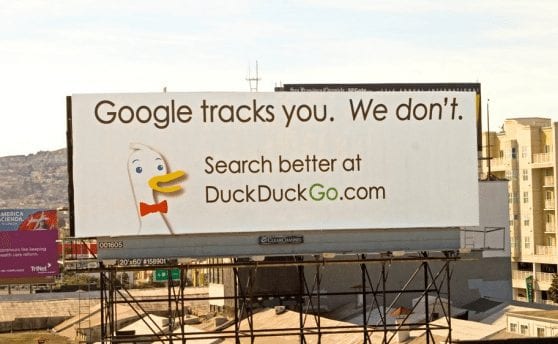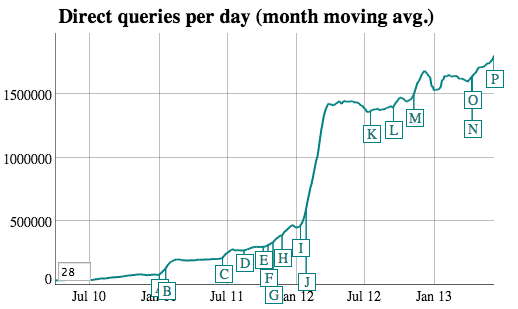It’s hard to imagine anyone surpassing Google in the search engine Game of Thrones. For years now, Google has been the go-to way to search the Internet, even making it into the popular lexicon (I know, I googled it). But as online privacy gains huge momentum in the media (see: PRISM and Edward Snowden), many people are seeking an alternative to the all-powerful Google. That’s where DuckDuckGo is making its small but noteworthy splash.

If you haven’t heard of it, DuckDuckGo is a search engine that tauts itself as being the “fair search” competitor of Google. Launched in September 2008 by Gabriel Weinberg, DuckDuckGo (unlike Google and other major search engines) doesn’t track your IP address or search history, doesn’t store your user information, and only uses cookies when needed.
Of course, its statistics are still modest by Google standards. While Google manages over a billion searches every day, DuckDuckGo recently hit a new personal record of 2.35 million searches in a day (following the release of PRISM). But while that number appears trivial, this search engine’s power becomes evident when you realize it has increased its traffic by 26 percent in just a week and tripled its traffic since January.

The current standings for search engines look like this—Google: 66.7%, Bing: 17.4%, Yahoo: 11.9%, Ask: 2.7%, AOL: 1.3%—but ever since PRISM was leaked and we learned that the National Security Agency (NSA) forces big search engines like Google to hand over user data, DuckDuckGo has made great progress. Concerned that the government is spying on their Internet behavior, users are losing faith in Google and jumping in the duck pond. And they’re not the only ones. Years ago, DuckDuckGo was promoted in respected journals like the New York Times and TIME Magazine.
So what makes DuckDuckGo so appealing? Although it’s named after a children’s game (Duck Duck Goose, though Weinberg maintains that the game is not a metaphor), this search engine has some serious strengths. It compiles its search results from about 50 different sources including Yahoo Search BOSS, Wikipedia, Bing, Wolfram Alpha, and its own web crawler (called DuckDuckBot). And when you perform a search on DuckDuckGo, you’ll notice that there’s a gray box hovering above those search results. The box includes summaries and related topics of your search term. Weinberg has also refined the results of the search engine by eliminating sites he believes are low quality, such as Demand Media’s eHow. And although DuckDuckGo, like Google, is funded through advertising, the ads are very minimal, taking a definite back-seat to the real star of the show: the search results.
While DuckDuckGo has gotten a huge boost in traffic since the release of PRISM, only time will tell if the numbers will drop back down, remain stagnant, or continue to grow at such an impressive rate. This is partially because it’s difficult to tell if the recent improvement is due mostly to PRISM or to DuckDuckGo’s recent media efforts. In the past few months, Weinberg has promoted the search engine in the Washington Post as well as on CNBC and Bloomberg. And of course the site’s main mode of marketing is word-of-mouth, as their website clearly states (a link on the homepage states “Help promote better search,” and another link on their “About” page touts, “Friends don’t let friends get tracked”).
If you want to hear more about DuckDuckGo, Weinberg succinctly explains the site and his issues with web privacy in the following video:
[arve url=”https://youtu.be/YbuNthXVugs” /]
It’s hard to imagine Google toppling from the top, but DuckDuckGo’s message is resonating with a lot of users. So what do you think? Which search engine has your vote?


